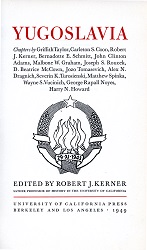Education
Education
Author(s): Severin Kazimierz Turosienski
Subject(s): Education, Interwar Period (1920 - 1939)
Published by: CEEOL Digital Reproductions / Collections
Keywords: illiteracy; school-system;
Summary/Abstract: Yugoslavia, young in its present political form but very old in traditions and culture, organized an educational system in 1918 that was free and obligatory for all its youth from infancy to early manhood and womanhood. Education has always had a significance beyond mere instruction in dry facts. It has become a national symbol of vital importance to a people who for hundreds of years were repressed as ignorant serfs by Turks, Magyars, Germans, or Italians. The tremendous value of education to the Yugoslavs can be better appreciated when it is remembered that “Black George,” the liberator and first ruler of Serbia, was an illiterate who could sign official documents only by making a rude cross. // Even to this day, illiteracy is high in the country. In the southern districts, where the Turks ruled longest, only 27-37 per cent of those over ten years of age could read and write. By way of comparison, in the Slovene districts, where the somewhat more enlightened Austrian rule had permitted education at a much earlier date, more than 94 per cent were literate. But in spite of the higher degree of literacy in the north, only 54.8 per cent of the nation as a whole could read and write. Among women this proportion was only 43 per cent, though men made a better showing (67.3 per cent).
Book: YUGOSLAVIA
- Page Range: 230-243
- Page Count: 14
- Publication Year: 1949
- Language: English
- Content File-PDF

